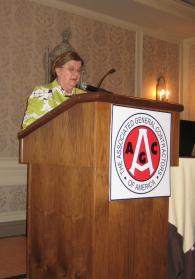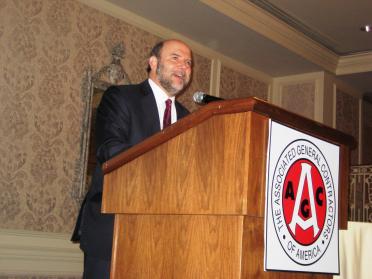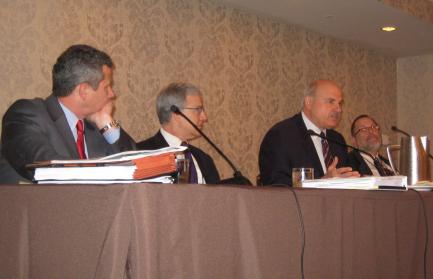


The AGC Labor and Employment Law Council held its 30th Annual Construction Labor Law Symposium on May 1 and 2, 2014, in Washington, D.C. Attorneys and chapter labor relations managers from across the country shared information and learned about the latest developments in construction labor and employment law.
The event began with a pre-symposium Davis-Bacon Workshop primarily focused on issues related to proper classification of Davis-Bacon-covered workers and to employer payment of covered-workers’ travel and lodging expenses. A panel of presenters including Timothy Helm, Branch Chief for Government Contracts Enforcement in the U.S. Department of Labor’s Wage and Hour Division, provided their legal and practical expertise on these often-confusing topics. Handouts are available to AGC members in the Labor and HR Topical Resources area of AGC’s website, under the main category “Compensation” and subcategory “Davis-Bacon Act.”
The following day, National Labor Relations Board (NLRB) Member Philip Miscimarra kicked off the main symposium with a presentation about the state of the current Board and its recent and pending cases in the construction industry. He said that members of the newly composed Board have many differences of opinion on substantive issues but have been dealing with one another in a very constructive and collegial manner. He noted that, unlike some past Boards, all five members of the present Board are true labor lawyers with considerable experience in collective bargaining and other traditional labor matters. Several, including Miscimarra himself, have significant experience in construction labor. Pending cases involving the industry include a case in which a union made allegedly “coercive” communications to a neutral employer about an unlawful subcontracting clause covering delivery, Miscimarra reported.
Peggy Mastroianni, Legal Counsel with the Equal Employment Opportunity Commission (EEOC), addressed her agency’s current approach to employer consideration of a job applicant’s or employee’s criminal or credit history. She talked about the controversial Enforcement Guidance on the Consideration of Arrest and Conviction Records in Employment Decisions that the EEOC issued in April 2012. According to the guidance and Mastroianni’s comments, employers are advised to: (1) use a ”targeted screen” that considers the nature and gravity of the offense, time elapsed since the offense or sentence, and the nature of the job; then (2) conduct an individualized assessment for those screened out in the first step. Blanket policies excluding everyone who has a criminal record are a bad idea, Mastroianni said. The EEOC has not issued new guidance on credit checks and has not said whether it intends to do so. The agency’s approach in both criminal and credit check cases has not fared well in court lately. Mastroianni maintained that the courts have not rejected the EEOC’s theories and have rejected only the evidence presented to support the theories. Therefore, she said, the agency is not planning to abandon its approach at this time. Her handout is also posted in AGC’s Labor and HR Topical Resourceslibrary, under the main category “EEO” and subcategory “Criminal Information.”
The symposium covered many other timely subjects. Those for which handouts are available are listed below, with their placement in Labor & HR Topical Resources library indicated in parentheses.
[[{"type":"media","view_mode":"media_large","fid":"4585","attributes":{"class":"media-image size-medium wp-image-19948 ","typeof":"foaf:Image","style":"","width":"300","height":"193","alt":""}}]]
Davis-Bacon Workshop Panelists (right to left) Bob Roginson, Bob Evnen, Larry Marquess, and Tim Helm.
- Contractor Considerations When Entering into National Agreements (main category “Collective Bargaining,” subcategory “National Agreements”)
- A Primer/Refresher on Lockouts Under the National Labor Relations Act (main category “Collective Bargaining,” subcategory “Strikes & Lockouts”)
- What’s Hot Cargo Got to Do with It? A Primer/Refresher on National Labor Relations Act Sec 8(e) (main category “Collective Bargaining,” subcategory “Subcontracting/Hot Cargo Agreements”)
- The Impact of the Affordable Care Act on Employers that Contribute to Multiemployer Plans (main category “Compensation,” subcategory “Multemployer/Taft-Hartley Benefit Plans & Trust Funds;” also under main category “Other HR Issues,” subcategory “Health Care Reform)
- Deconstructing a Trust Agreement’s Operational and Governance Provisions (main category “Compensation,” subcategory “Multemployer/Taft-Hartley Benefit Plans & Trust Funds”)
- Withdrawal Liability and Control Group Issues (main category “Compensation,” subcategory “Multemployer/Taft-Hartley Benefit Plans & Trust Funds”).